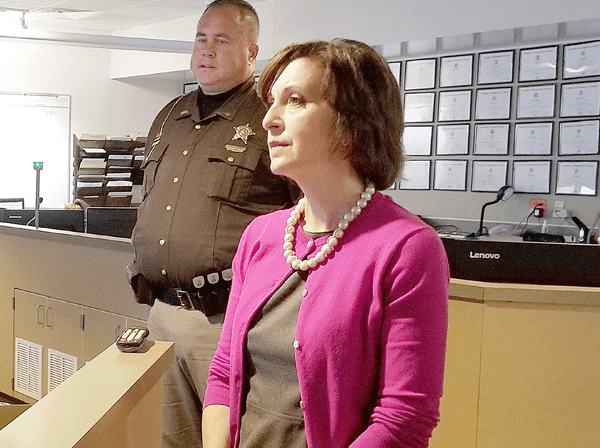Indiana State Treasurer Kelly Mitchell toured Kosciusko County’s central dispatch center Thursday morning, touting the ability to use text to alert authorities to an emergency.
The 911 texting feature was established about two years ago. While many people are still unaware of the service, officials are seeing some benefits.
According to state figures, Kosciusko County’s dispatch center received 352 communications through text that originated with the public during a 12-month period that ended in May. That level of interaction is seventh highest among the state’s 92 counties, according to information provided by the state office.
During that same period, central dispatch received 183,155 emergency calls.
Officials believe those numbers will rise with increased awareness.
Placing a text to central dispatch is done by typing 911 in the address bar where phone numbers are placed.
Officials say it’s imperative to include the location with a description of the emergency.
While software allows dispatchers to narrow the location, it is not as exact as the details automatically provided through a 911 phone call, said Sarah Lancaster, the assistant director of the 911 center, who toured the facility with Director Rick Shepherd and Mitchell.
“Phone is still prefered, but if you are having trouble speaking or hearing or if you don’t want to be heard calling for help, know that text 911 is available,” Mitchell said.
Texting is also handy for dispatchers when they receive an accidental call, often known as pocket dials.
Dispatchers will call the number to determine what’s happening, but have learned that texting is often more effective.
“People will answer a text much more than a number they don’t know,” Lancaster said.
If dispatchers are unable to talk with the person who placed the call, they will make several attempts to contact the person before sending an officer for a welfare check, Shepherd said.
While texting is a good alternative, nothing beats a phone conversation.
“Voice is always so much better,” Lancaster said, noting that dispatchers can learn more about the circumstances when they can hear background noise and background talk.
Mitchell is in the middle of a 25-county tour of 911 centers.
Oversight of the 911 system comes from the fact that the state treasurer’s office collects 911 fees from phone bills and then disperses that money back to counties.
Mitchell heads up the state’s Emergency 911 board, which is responsible for statewide infrastructure and implemented the texting 911 program. At the time, the statewide effort was viewed as the world’s largest 911 texting system in the world, Mitchell said.
“We are quite literally world leaders in 911 technology.”





